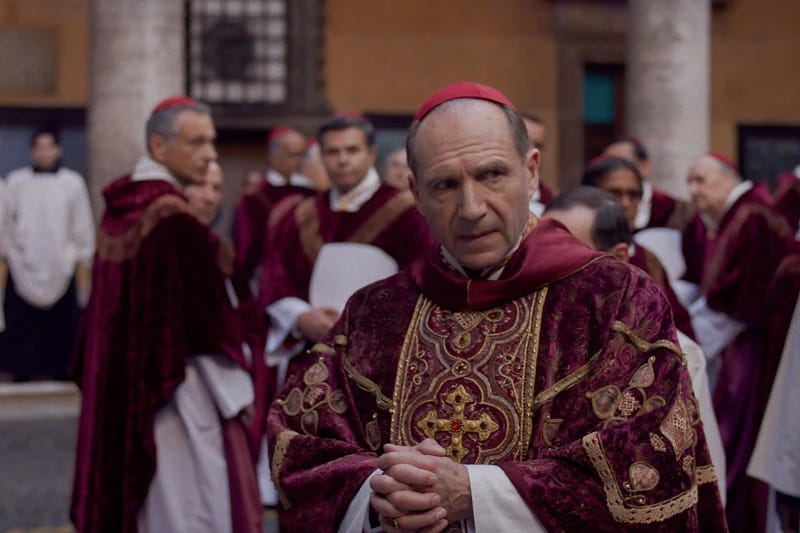Conclave
Ralph Fiennes leads a remarkable cast in Edward Berger's engaging political thriller.
Yesterday morning, as I was texting my Mom and told her I was seeing a movie titled “Conclave,” her first question was whether or not I was seeing another one of those Catholic-based horror movies that have been having a bit of a comeback this year. When I sent her the poster, she was just even more confused.
I’ve always been a fan of just about any type of movie; but costume dramas, like the poster for “Conclave” suggests? Not really my thing.
But despite what the prestigious team behind the movie and all the Oscar buzz may suggest, “Conclave” is far more pulpy than you may expect. The latest movie from Edward Berger, the director of “All Quiet on the Western Front,” adapts Robert Harris’ 2016 novel of the same name, a work that many critics have hailed as an airport novel.
You know, one of those books that may not be high-art, but when you’re waiting at the airport or on a long flight with zero wifi, it gives you enough entertainment to enjoy yourself.
I didn’t know that before seeing the film adaptation, so I was clearly in for a wild ride.
“Conclave” opens with the death of the Pope, leading the College of Cardinals to gather for a papal conclave where they will vote on deciding the new pope. Overseeing this sacred tradition is Cardinal-Dean Thomas Lawrence (Ralph Fiennes), who in the midst of a crisis of faith, is attempting to leave the church.
However, despite the Cardinals’ holy positions, this process is full of much more melodrama and toxicity than you might expect.
“Conclave” isn’t as deep or thought-provoking as you may expect, but that doesn’t mean it doesn’t have anything on its mind. Berger’s main target in “Conclave” isn’t belief or tearing down beliefs, it’s about institutionalism and the hypocritical nature of those in power, who will preach one thing, but do the opposite in order to get what they want.
It’s a bit shocking that “Conclave” was able to get away with a “family-friendly” PG rating. Not because it’s laced with vulgarities, sex, and blood, but because it’s one of those adult dramas we don’t see too much of anymore, especially on the big screen.
We go into the movie expecting the characters to act a certain way, but in reality, most of them act like your typical modern-day politicians. They’re constantly at each other’s throats, stabbing each other in the back, and belittling one another, all in the name of becoming the new pope. It’s not that every single character is unlikable, we do care about Fiennes’ Lawrence, but most of these characters still feel unfiltered and real.
The always reliable Fiennes is nothing short of terrific in his role as Cardinal-Dean Lawrence. Fiennes has always had a knack for playing characters with sinister undercurrents, but in a refreshing twist, he’s truly one of the more even-keeled people present. Fiennes perfectly sets up his character’s initially self-serious nature and masterfully portrays Lawrence’s crisis of faith. Despite playing a powerful figure, Fiennes is willing to let himself be vulnerable.
Stanley Tucci is another major standout as Cardinal Bellini and channels everything that we love about him as an actor. Much like Fiennes, Bellini is one of the more sympathetic figures in the movie and also gets to show a more nuanced take on his character. Especially compared to Sergio Castellitto’s loud-mouthed Cardinal Tedesco, who amusingly plays like if you placed Donald Trump into the Vatican. The undertones become much more obvious when Castelitto is on the screen, but it never becomes too distracting and adds to the entertainment factor.
John Lithgow and Isabella Rossellini are also outstanding in their roles, despite their more limited screen time, while newcomer Carlos Diehz turns in some spectacular work in the movie’s final act.
Stéphane Fontaine’s cinematography is gorgeous. While most of the movie takes place solely in the Vatican, with the characters standing around and talking and arguing, the camera work makes even simple conversations feel so cinematic. A particular scene, involving the Cardinals walking down a path, all holding white umbrellas, feels particularly striking.
On paper, the twists in “Conclave” may initially seem like the movie is trying to be provocative, but in context, Berger implements them in a way that really helps hammer the themes home. This isn’t an anti-Catholic movie, instead, it’s more of a reflection on the constant evolution (and devolution) of the church.
“Conclave” is without question one of the better movies you’ll see this year. Even if you’re not all that familiar with the papal election or politics within the Catholic Church. Berger tells this story with supreme confidence, which is further elevated by a remarkable cast.




Great story and acting. I was surprised that after making the point of the gray smoke signaling the continuation of the conclave, they showed the final ballots being burned, but did not show the white smoke that would signal that a new pope had been chosen. I'm picky like that...
I don’t think Lithgow knew anything about the black cardinal’s past